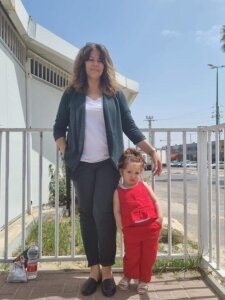In the darkness of Israeli prison cells and the Supreme Court’s halls, there’s no shortage of injustice levied against Palestinian detainees. We were reminded of this grim reality last week when the Israeli Local District Court denied the release of terminally-ill Palestinian prisoner Walid Daqqah, who has completed his 37-year sentence but is still being held for an additional two years for acts he carried out inside prison. One of those acts is smuggling cell phones inside prison, which Palestinian prisoners use to contact loved ones in light of the denial of family visitation. The other is the smuggling of his own sperm outside of prison to his wife, Sana Salameh, in a fertility clinic.
Together, they conceived their daughter, Milad, which in Arabic means “birth.” Milad is now 3.
Walid is not the only Palestinian to smuggle his sperm outside of prison. The story of Walid Daqqah is the story of a nation, and many others have sought to stubbornly cling to life by insisting on creating it, even as they languish behind the prison’s walls. As Daqqah was serving his life sentence, he requested the Israeli court to allow him to have children given his long-term sentence, but his request was denied. So when he and others like him defied the Israeli prison authorities, they faced harsh repercussions. For Walid, he was denied family visitation and the right to visit his daughter, and his sentence was extended. Daqqah’s family has stated that the Israeli District Court’s recent decision to deny his early release is effectively a death sentence.

But for Palestinian prisoners, these punitive measures have hardly deterred them in their attempt to resist the attempts of the Israeli prison system to break them. Most Palestinian prisoners enter Israeli prison very young, and leave — if they are lucky — significantly older. Many are serving double or triple life sentences amounting to over 100 years — commonplace sentences for Palestinians in Israeli prisons.
Advertisement
Instead of losing hope, Palestinian prisoners — especially the married ones with spouses waiting for them on the outside — conceived an entire generation of Palestinian children through smuggled sperm. These children are known as “the ambassadors of freedom.”
How sperm smuggling started
Sperm smuggling started in 2012 as a reaction to the Israeli ban on family visitation for Palestinian prisoners. The first successful case of smuggled sperm was in August 2012, when Palestinian prisoner Ammar al-Zobn from Nablus, who was serving 26 consecutive life sentences, successfully smuggled his sperm to his wife, bringing to life a baby boy.
Since then, the phenomenon of sperm smuggling has increased dramatically among Palestinian prisoners, especially with the predominance of long sentences. Even if these prisoners are eventually released, by the time they are, having a child in most cases is not an option. This is their way of fighting back against the fate that Israel decided for them.
Tamer Za’anin, 38, is the first prisoner from Gaza who successfully conceived a child through smuggled sperm and who was later released to meet that child for the first time after serving his 12-year sentence.
Tamer now lives in Beit Hanoun in northern Gaza. For him, the years he spent in prison were not wasted because it was in those years that he was able to father his son, Hassan.
His wife Aysha had heard the news in 2013 about a prisoner’s wife from the West Bank who got pregnant through smuggled sperm. Aysha immediately wanted the same. “I was hesitant and worried about my wife,” Tamer told Mondoweiss. “I was afraid that society would judge her. But my wife was prepared for everything. Whenever I expressed any fear, she reassured me.”
Aysha told Mondoweiss that she was desperate for a child, as her husband would be in prison for 12 years.
“Smuggling my husband’s sperm embodied a vow that I will never let my husband down or leave him alone,” she said. “After I received the sperm, I started to do everything to make Tamer feel better. So I informed the family, the local news, and the nearby mosques that I got a sperm sample from my detained husband and that I will use it to get pregnant,” she added.
Now that they can be a family together, Tamer, Aysha, and their child Hassan are all grateful for taking that risk and overcoming it.
“When I got out of prison and hugged my son, I felt that all the years I spent inside Israeli prison blowing away with the wind,” Tamer told Mondoweiss. “I felt that I could be with my family. It’s an indescribable feeling.”
Criminalizing sperm smuggling, criminalizing life
In June of this year in eastern Shuja’iyya, a small celebration was being held for newborn quadruplets who arrived home in full health, all of them born from the smuggled sperm of their father, Ahmad Shamali, who has three years left on an 18-year sentence. The Shamali family won’t reveal how it was smuggled outside of Israeli prison or how it reached them, as they do not want Israel to discover the different smuggling methods at the disposal of Palestinian prisoners. Usually, prisoners are happy to have one child from the smuggling of such sensitive material, and they were granted four all at once.
“It’s a huge victory and a source of happiness for all of us,” Ahmad’s wife said in an earlier interview with the local media. “We tried two times before this one, but it didn’t work. Now, by the grace of God, we’ve been blessed with four children all at once.”
But after a week of the intense media attention that their case received, the Israeli Prison Services retaliated by punishing Ahmad, placing him in solitary confinement. As a result, the family no longer speaks to the media, not wanting to give Israeli authorities any additional reason to enact punitive measures against Ahmad.
Cases like these have made families in Gaza whose children were born through smuggled sperm and whose father still remains behind bars reluctant to speak to the media. And Israel’s penalization of Palestinian prisoners for their actions has only increased in recent years. “There are harsh Israeli sanctions on prisoners who managed to smuggle their sperm,” Abdullah Qandeel, a representative of the Wa’ed Institute for Prisoner Affairs in Gaza, told Mondoweiss. “This includes solitary confinement and bans on family visitation.”
In fact, Israeli authorities refuse to acknowledge these children are actually related to the prisoner, a form of institutional violence that has real consequences.

“Israel does not recognize the newborn babies conceived through smuggled sperm,” Qandeel clarified. “So there is no way for them to visit their fathers inside Israeli prison.”
There have been some very rare exceptions. One of them is Milad, who was able to visit her father, Walid, after several attempts. But the vast majority do not get this chance.
“Family visitation for prisoners without barriers is one of the many rights guaranteed by international law,” Qandeel said. “But Israel denies them this right.”
In doing so, Israel criminalizes Palestinian life itself. In the face of this criminalization, Palestinian prisoners continue to insist on their right to freedom, and their right to life by creating it.
And as of the time of writing, 115 children have been born in Gaza through smuggled sperm.
This post was originally published on this site be sure to check out more of their content.






